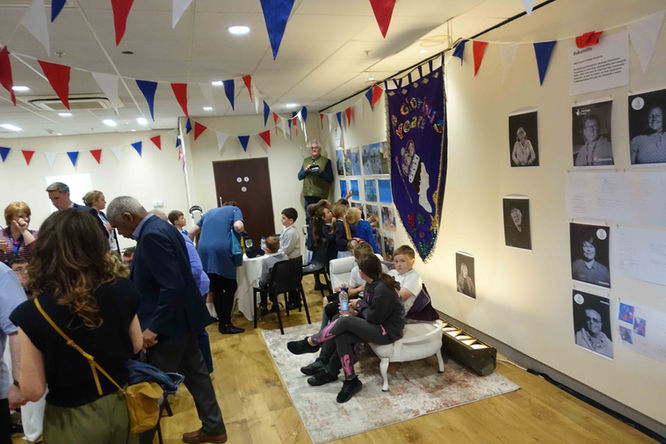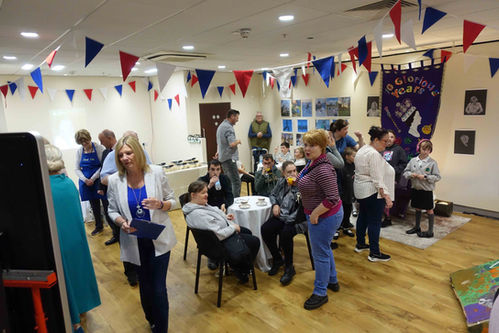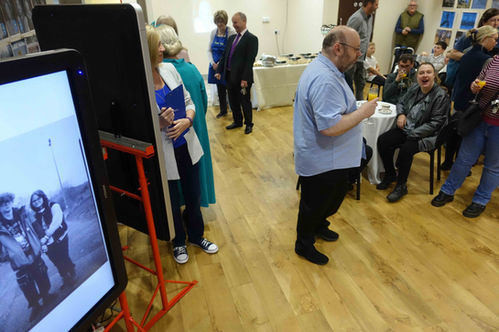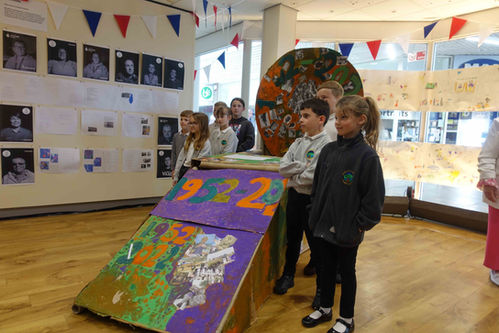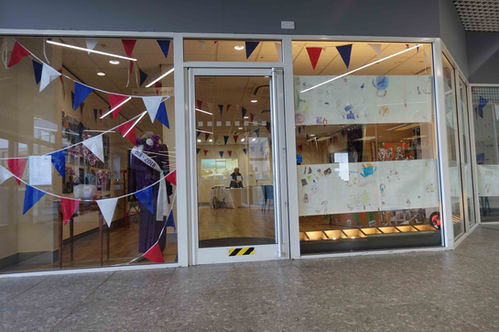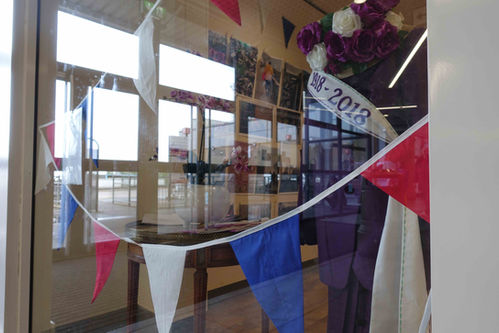#skemlife
Project Exhibition
Collaborating with the Concourse Shopping Centre the Project held a free Exhibition running for three days in the centre of Skelmersdale. The exhibition had over 200 prints that included work from Woodland Community Primary School, Crow Orchard Primary School, West Lancashire College Art Students and the work produced by the West Lancashire College Inclusivity group. All the school art work was displayed, as was portraits of the other participants from the Oral Heritage Groups and other work produced by the community such as the Silver Sewer’s Queen Elizabeth banner and the Time Machine.
Interviews where projected on a screen with Silent Disco headphones available to listen to the audio for an immersive effect. The Silent Disco headphones also formed part of a neuro-diverse sensitive approach by providing a more sensory experience for those that wanted it.

A launch event was organised that was attended by over 100 people with local press present. Food and drink was served by Sewing Room volunteers and staff, aided by the Silver Sewers. Each school attended bringing 12 pupil representatives with staff, the West Lancs College Art Department and their art students, the Inclusivity Group, Artz Centre, Skem Men Aces FC and other community members who participated in the project. Local councillors, the Mayoress and other Skelmersdale dignitaries supported the launch with their presence. Ashley Dalton MP opened the exhibition with a powerful speech about heritage.
Ashley Dalton MP
Okay. Who knows what an MP is?
A Member of Parliament.
That's right. And what's parliament?
Anyone know?
That's right. It's part of the government. So, yeah, basically it's my job to go to London and sit in the House of Commons, which is where people from all over the country go, and we make the law basically. And the government runs the country and together we all make sure that everything's happening that needs to, and we make the laws and we decide where money's going to be spent.
And it's my job to go and represent the people of West Lancashire. So that includes Skelmersdale. And, you know, just to say that whilst Ian said that he was very moved by the first speech that I made, because that's what we do in Parliament, we get up and make speeches... A lot of hot air! He was moved by that. You know, I was able to make that speech because I have been so moved by the people of Skelmersdale and West Lancashire as a whole.
And because it really is people that make up a place, you know, you can build as many houses and as many roads and as many shops as you like, but they're useless without people in them. And it's people that make our communities. And so over 70 years ago, when Skelmersdale was envisaged and envisioned and they started to bring it to life, it was about creating a place for people to thrive.
And what I love about this project is it's demonstrating that at every level. You talked earlier about how this is about heritage, which is about history and the clues in the name history... Story. It's about stories. And stories are one of the most important things that we as human beings use to not only tell other people what we like or what life is like, but also to understand ourselves, the world, and to understand how to work in it.
And history. Traditionally, you know, it's not difficult to find books about kings or queens or, you know, people like me in the House of Commons. People tend to write about those people quite a lot, but they don't tend to write too much about ordinary people, and they certainly don't tend to write too much about ordinary people from the northwest. And they don't tend to write too much about people from Lancashire. So what you're doing is really, really important because your stories are going to be the way that people in 100, 200, 300 years time understand what life was like, and we can only understand who we are if we know where we've come from and how we've grown.
And we can only make sure that we move forward positively if we understand where we are and where we've come from. So to me, this kind of project is really important for that reason. But it's also really important because it's about the community that you build. I love the fact that you've had people going out interviewing people, perhaps, you know, young people interviewing older people that you might not normally get to speak to. And you might have people in your family that have got, you know, the stories that these other people have got to share.
So it's all about sharing stories. And what you've done today is bring your stories and put them in a way that everyone can dig in and understand them. But when I made that first speech in the House of Commons, I told stories too. And I told stories about people that live here in West Lancashire. They told a story about story about Paula and Maureen and how they set up the Sewing Rooms. And it's really important that as ordinary people, we write down our stories, that we make sure that the experiences and the lives of real people are remembered in the future.
So who here keeps a diary?
Sometimes... Doesn't have to be every day.
Brilliant... Because all of the history, all of the things that are happening to you every single day and what you experience will one day be history. So write it down. You don't know where you're going in life. One day you could find yourself in the House of Commons. You've never written a diary in your life. And you're saying, oh, how did I get here? But actually write it down because your memories are really important. And your experience is really important. Because it's the history of our future. So well done. It is my absolute pleasure to be a part of this, and it's my absolute pleasure to now officially announce the exhibition open.







